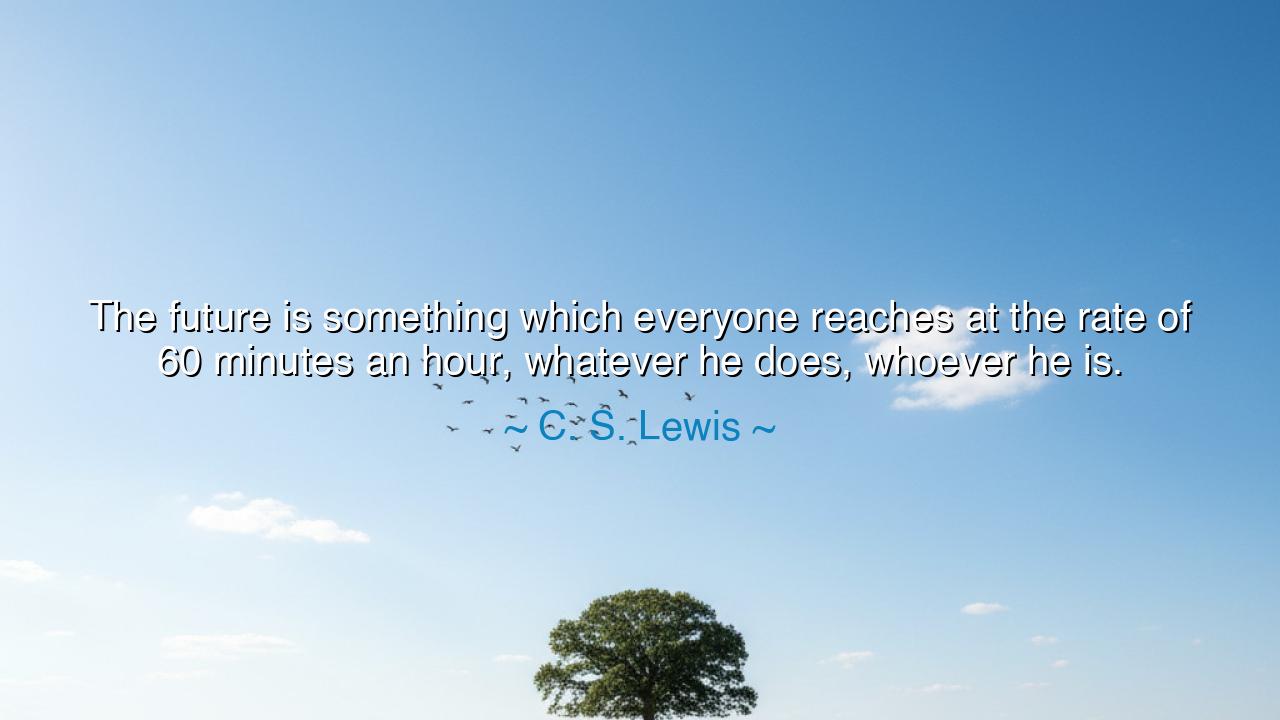
The future is something which everyone reaches at the rate of 60
The future is something which everyone reaches at the rate of 60 minutes an hour, whatever he does, whoever he is.






“The future is something which everyone reaches at the rate of 60 minutes an hour, whatever he does, whoever he is.” Thus spoke C. S. Lewis, the sage of imagination and faith, whose words often carried the quiet thunder of eternal truth. In this reflection, Lewis does not speak merely of time’s passing, but of the profound equality of destiny—that all souls, regardless of wealth or power, race or creed, move through the same current of hours and minutes, borne onward toward the unknown shore of the future. His words are both humbling and liberating, for they remind us that though life’s circumstances may differ, the march of time is the one inheritance all humanity shares.
The origin of this quote can be found in Lewis’s meditations on the nature of existence—how mortal beings, bound by time, experience the unfolding of life in increments they cannot hasten or escape. He was a man deeply aware of the paradox of time: that it is both fleeting and eternal, both gift and burden. In his writings, from Mere Christianity to The Screwtape Letters, he returned often to the idea that time is the stage upon which the soul performs its eternal task—to grow, to learn, to love, and to prepare for what lies beyond. Here, in this single sentence, he captures the quiet truth that no one can outrun time, and no one can lag behind it. The emperor and the beggar alike are carried forward at the same pace—sixty minutes an hour, every hour, until the end.
Lewis’s words invite us to humility. For in the modern world, humanity builds machines to move faster, crafts empires of ambition, and dreams of transcending limitation. Yet, in the realm of time, all such efforts crumble before the clock. Whether a king sits in his marble hall or a shepherd tends his flock beneath the stars, both live within the same sacred rhythm. The hours do not bend to wealth, nor do they slow for sorrow. Thus, time becomes the great equalizer, reminding each of us that the true measure of life is not in how swiftly we reach the future, but in how wisely we walk toward it.
Consider, for instance, the life of Abraham Lincoln, who began in obscurity, born in a log cabin with little means and less comfort. The powerful of his day may have moved through the same minutes, but he used them with purpose. While others spent their hours chasing pleasure or prestige, Lincoln filled his with study, reflection, and a deepening understanding of justice. When the nation’s darkest hour came, he stood ready, tempered by time itself. His story reminds us that though all men are granted the same number of minutes per hour, it is not the speed but the substance of our time that shapes destiny.
Lewis’s reflection also speaks to the futility of comparison. In an age where envy devours peace, his words call us back to perspective. Why compare our pace to another’s, when time treats all equally? The artist laboring in obscurity, the mother raising her child, the soldier standing guard, the thinker lost in prayer—all advance toward the future at the same rate. The question, then, is not when we arrive, but how we journey. Each hour, each minute, carries the same weight for all; the difference lies in what we make of it. To live meaningfully, we must treat every moment as a sacred coin, spent either on vanity or on virtue.
There is also comfort in this truth. For those who despair at their pace—who feel left behind, or burdened by delay—Lewis’s words are a gentle hand upon the shoulder. Time is not a race, but a river. You cannot rush it, but neither can you be abandoned by it. The future comes to all who live, whether they walk or crawl toward it. In the patience of time, every wound heals, every lesson ripens, and every dawn follows night. The fool may waste his minutes; the wise man redeems them. But both, in their own way, will meet the future—inevitably, unavoidably, at the same unhurried rate.
So, my listener, take this as your lesson: treasure the sixty minutes of each hour as your truest wealth. You cannot hasten the sun’s rising, nor delay its setting, but you can choose what you do beneath its light. Do not squander your time chasing the illusions of speed or status. Instead, fill your hours with meaning—with learning, kindness, reflection, and creation. The seconds that pass will never return, but the way you use them will echo through eternity.
And as C. S. Lewis reminds us, no matter who you are—king or pauper, scholar or child—you travel through time at the same pace as all humankind. The future waits for no one, but neither does it forget anyone. Walk your path with intention, knowing that each moment, each breath, each heartbeat is both a gift and a step toward destiny. For though we all reach the future at sixty minutes an hour, it is how we live within those minutes that determines whether our future will be fleeting shadow or lasting light.






AAdministratorAdministrator
Welcome, honored guests. Please leave a comment, we will respond soon